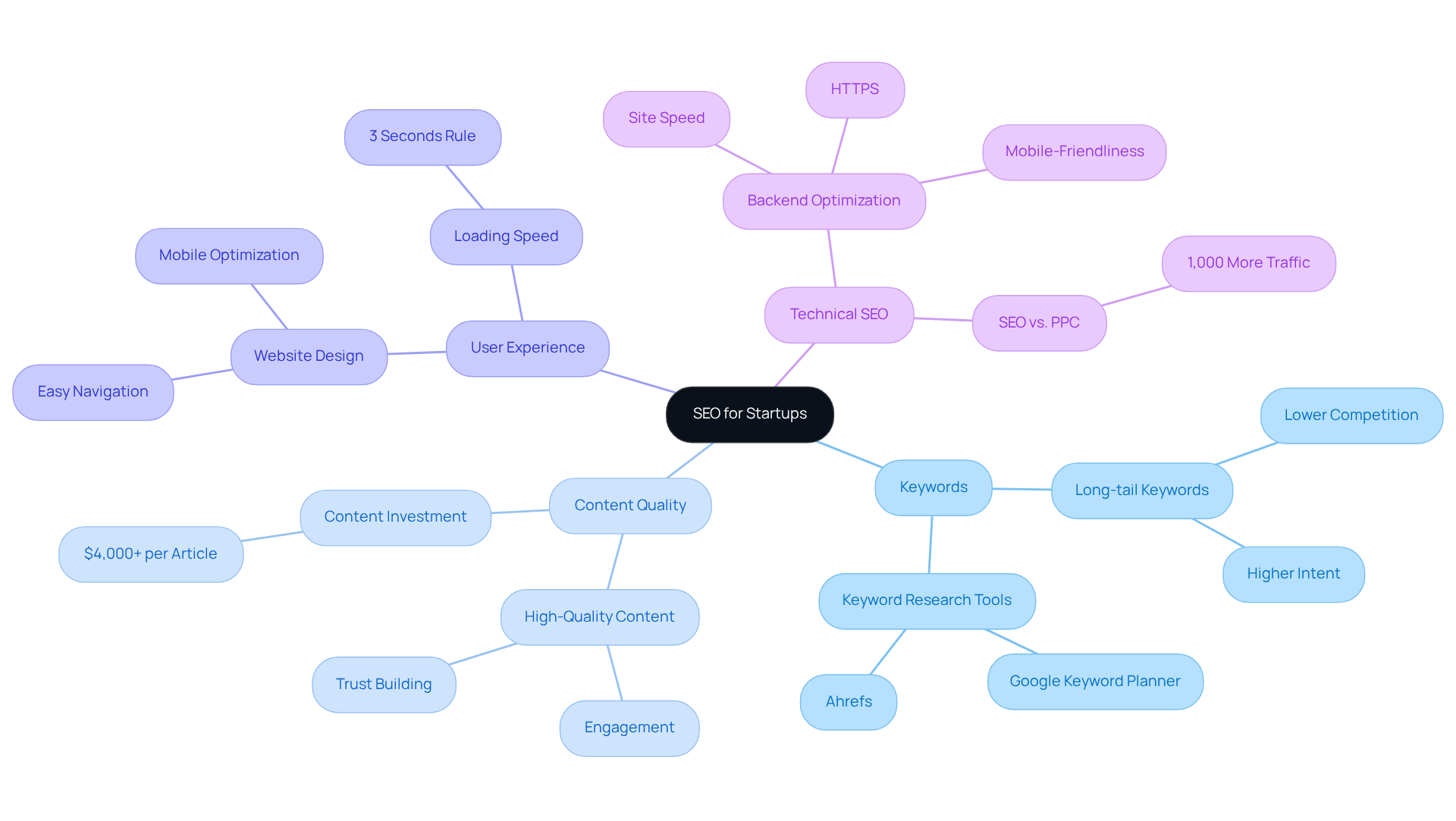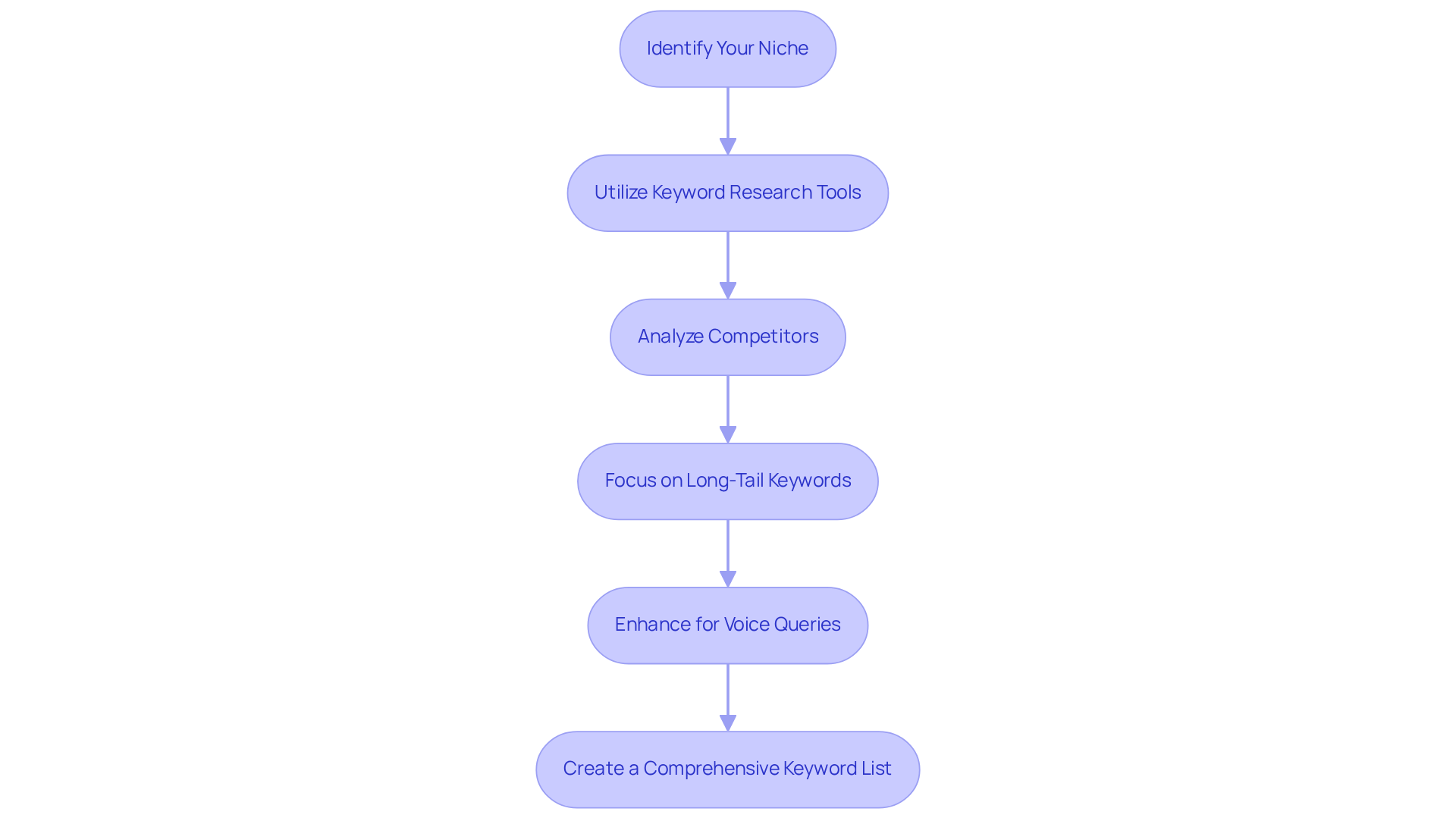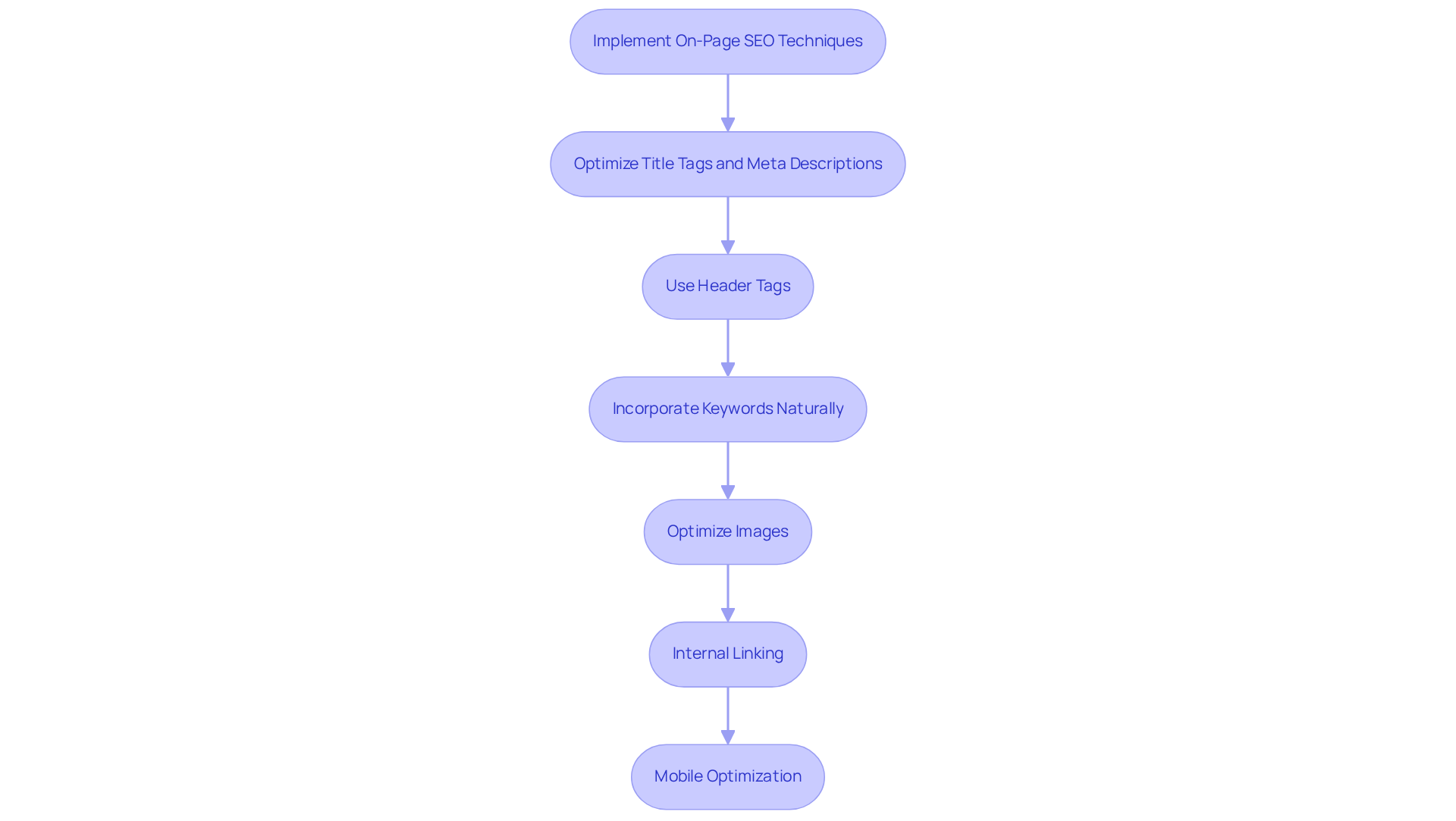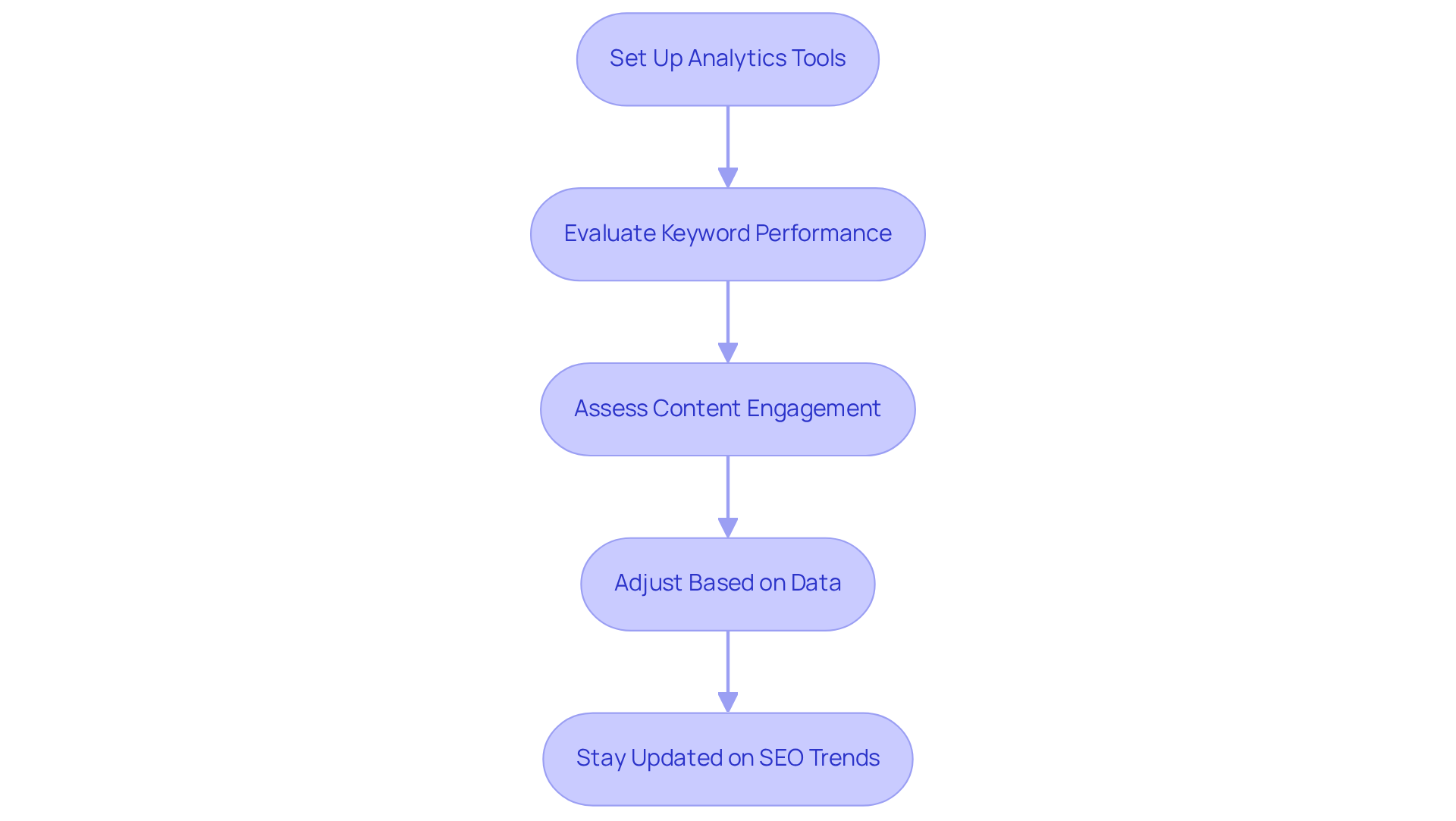Overview
Tech startups often find themselves grappling with the challenge of enhancing their online visibility. This struggle can lead to feelings of frustration and uncertainty, especially when considering the competitive landscape of the digital world. It's important to recognize that focusing on key areas such as:
- Keyword research
- High-quality content creation
- User experience
- Technical optimization
can make a significant difference. By mastering these foundational elements, you can not only improve your website's performance but also drive customer acquisition effectively. Remember, the impact of organic search traffic is substantial, and it can be a game-changer for your startup. Embracing these strategies with compassion for your journey can lead to meaningful results and a stronger connection with your audience.
Introduction
Search Engine Optimization (SEO) can feel like a daunting mountain to climb for many tech startups, often leaving them feeling overwhelmed by its complexities. This struggle not only hampers their ability to attract potential clients but also makes it difficult for them to establish their unique presence in a crowded digital marketplace.
As founders, you may wonder: how can you harness the power of SEO to enhance your online visibility and foster sustainable growth amidst the noise? This article aims to provide you with essential strategies that will transform your approach to SEO, helping you stand out in search results and connect authentically with your audience.
Together, we can navigate this journey toward success.
Understand the Basics of SEO for Your Startup
Search Engine Optimization (SEO) can feel overwhelming, especially for tech startups striving to enhance their online visibility and attract potential clients actively searching for their products or services. It’s a common struggle, and understanding the key components of an effective SEO strategy can make a significant difference.
- Keywords are at the heart of this journey. These are the terms users type into search engines, and recognizing the right ones is essential for enhancing your content. Long-tail keywords, which account for 70% of all online inquiries, can be particularly beneficial due to their lower competition and higher intent. By focusing on these, you can connect more deeply with your audience.
- Next, consider Content Quality. Producing high-quality, relevant content is vital for engaging users and encouraging them to stay on your site. Many businesses that invest significantly in content marketing report higher success rates, underscoring the need for a solid content strategy. In fact, those who spend $4,000 or more per article are likelier to see content marketing success. This investment not only builds trust but also fosters a sense of community around your brand.
- User Experience (UX) is another crucial element. A well-designed website that is easy to navigate enhances user satisfaction, which can positively influence your SEO rankings. With 53% of mobile visitors leaving a site that takes more than three seconds to load, is critical. Additionally, 72% of people turn to Google search to find local businesses, highlighting the importance of local SEO. By prioritizing UX, you show your audience that you care about their experience.
- Then, there's Technical SEO. This involves optimizing your website's backend structure, including site speed, mobile-friendliness, and secure connections (HTTPS). Since mobile devices account for over 63% of online visits, ensuring your site is mobile-optimized is crucial for attracting and retaining visitors. Moreover, SEO drives over 1,000% more traffic than organic social media, making it a vital strategy for tech startups. Embracing these technical aspects can feel daunting, but it’s a necessary step toward growth.
By mastering these foundational elements, tech startups can learn how to seo website, establishing a robust strategy that not only improves visibility but also drives customer acquisition and growth. With 65% of individuals who search for information on Google clicking on an organic result, the importance of optimizing for SEO cannot be overstated. Remember, you’re not alone in this journey; by focusing on these strategies, you can pave the way for your startup’s success.

Conduct Effective Keyword Research
Conducting effective keyword research can feel overwhelming, especially for startup founders who are passionate about their unique offerings. It’s essential to first identify your niche. Understand your startup's and the specific problems it addresses. This clarity will help you pinpoint relevant topics that truly resonate with your target audience.
Next, utilize keyword research tools. Employ resources like Google Keyword Planner, Ahrefs, SEMrush, and KWFinder to uncover terms that relate to your niche. Aim for terms that strike a balance between search volume and competition; this will enhance your visibility and connect you with those who need your solutions.
It’s also beneficial to analyze your competitors. Investigating the terms they are ranking for can reveal important keywords you might have overlooked. This analysis not only informs your strategy but also helps you to navigate the competitive landscape more effectively.
Focusing on long-tail keywords is another crucial step. Prioritize longer, more specific phrases that typically exhibit lower competition and higher conversion rates. For instance, instead of targeting a broad term like "SEO," consider something more specific, such as "SEO strategies for tech startups." Long-tail phrases often represent a substantial share of query traffic, making them essential for targeting your niche audience.
As we embrace the future, enhancing for voice queries is increasingly relevant. With 20.5% of the global population utilizing voice technology, think about how your terms can align with these inquiries. This trend is especially important for tech startups aiming to capture a broader audience.
Finally, create a comprehensive keyword list that focuses on how to seo website. Compile an extensive list of target terms, categorizing them based on relevance and intent. This structured approach will guide your content development and enhancement efforts, teaching you how to seo website to align with user inquiry behavior.
Looking ahead to 2025, the average search volume for long-tail phrases in the tech industry continues to grow, reflecting the evolving search landscape. Startups that identify and implement niche terms effectively can significantly enhance their online presence and drive targeted traffic, ultimately fulfilling their mission to connect with those they aim to serve.

Implement On-Page SEO Techniques
To effectively implement on-page SEO techniques, it’s important to recognize the challenges tech startups face in gaining visibility. Many founders may feel overwhelmed by the complexities of SEO, worrying that their hard work might go unnoticed. This concern can be disheartening, especially when striving to make a mark in a competitive landscape.
- Optimize Title Tags and Meta Descriptions: Each page should feature a unique title tag and meta description that incorporates target keywords. Research indicates that title tags between 40 to 60 characters yield the highest organic click-through rates (CTR), with a 33.3% increase compared to those outside this range, as noted by Semrush. This practice assists engines in accurately understanding your page's content, alleviating some of that anxiety about being overlooked.
- Use Header Tags: Structuring your content with header tags (H1, H2, H3) can enhance readability and SEO. The H1 tag should prominently display your primary keyword, as it plays a crucial role in indicating the main topic of the page to indexing engines. Incorporating expert insights on the impact of header tags can further emphasize their importance in SEO rankings, reassuring you that you’re on the right path.
- Incorporate Keywords Naturally: Integrate your target keywords throughout the content without resorting to keyword stuffing. A natural flow not only enhances readability but also aligns with engine algorithms that favor user-friendly content, helping to ease your concerns about being penalized for over-optimization.
- Optimize Images: Utilizing descriptive file names and alt text for images enhances accessibility and SEO. This practice helps engines grasp the context of your images, contributing to overall site optimization, and ensuring that your visuals support your message effectively.
- Internal Linking: Establishing connections to other pertinent pages within your site enhances navigation and helps engines crawl your site more efficiently. This strategy can improve user engagement and reduce bounce rates, fostering a more connected experience for your visitors.
- Mobile Optimization: Ensuring your website is mobile-friendly is crucial, as over 50% of inquiries in the U.S. occur on mobile devices. Implementing responsive design provides an optimal user experience across all devices, which is essential for retaining visitors and improving rankings.
By concentrating on these vital on-page SEO methods, tech startups can learn how to seo website to significantly improve their visibility and performance in search engine results. Remember, the top result in Google’s organic listings has an average CTR of 27.6%, underscoring the importance of enhancing these elements for improved visibility. You’re not alone in this journey; with the right strategies, you can and achieve the recognition your startup deserves.

Analyze and Adjust Your SEO Strategy
To effectively analyze and adjust your SEO strategy, let's consider some nurturing steps together:
- Set Up Analytics Tools: Begin by implementing tools like Google Analytics and Google Search Console. These will help you monitor your website's performance. Focus on essential metrics such as organic visits, bounce rate, and conversion rates, as these indicators are vital for understanding user behavior and site effectiveness. As Sherrie Gossett reminds us, "Organic search is still the #1 source of visitors for websites," highlighting the importance of tracking these metrics to support your growth.
- Evaluate Keyword Performance: Regularly assess how your target terms are performing. It's important to determine which terms are effectively bringing visitors and which might need a little enhancement or even substitution. Remember, long-tail phrases, which represent 70% of all search activity, can be especially powerful in attracting the right audience.
- Assess Content Engagement: Take a moment to analyze user engagement metrics, including time on page and pages per session. These insights can help you gauge how well your content resonates with visitors. Higher engagement levels often correlate with improved organic growth, which is expected to represent 53% of all website visits by 2025.
- Adjust Based on Data: Use the insights gained from your analysis to make informed adjustments to your SEO strategy. This might involve updating existing content, targeting new keywords, or enhancing your site structure to improve user experience. Successful tech startups have shown that data-driven modifications can lead to substantial growth in organic visitors. For instance, one startup optimized their content based on analytics and saw a remarkable 40% boost in organic visitors within just three months.
- Stay Updated on SEO Trends: SEO is a dynamic field that requires continuous learning and adaptation. To ensure your strategy remains effective, it's important to learn how to seo website by staying informed about the and algorithm updates. Industry experts note that utilizing Google Analytics not only helps track SEO success but also informs strategic decisions that can enhance your overall performance. Additionally, with mobile devices accounting for 62.54% of global organic search traffic in Q4 2024, ensuring your site is mobile-optimized is crucial for maintaining visibility and engagement.
By embracing these steps and nurturing your SEO strategy, you can foster growth and connection with your audience, ensuring your startup thrives in a competitive landscape.

Conclusion
Mastering the essentials of SEO can feel overwhelming for tech startups striving to enhance their online presence and connect with the right audience. The complexities of digital marketing often weigh heavily, but by focusing on key components such as:
- Keyword research
- Content quality
- User experience
- Technical SEO
startups can navigate these challenges with greater ease. Each of these elements is crucial in building a solid SEO strategy that not only boosts visibility but also fosters customer acquisition and growth.
This article emphasizes the significance of long-tail keywords, high-quality content, and a seamless user experience as foundational strategies for success. It’s important for startups to embrace analytics tools to monitor their performance and adapt their strategies as needed. By regularly evaluating keyword effectiveness, content engagement, and keeping abreast of industry trends, startups can make informed decisions that lead to meaningful organic growth.
In conclusion, embracing these SEO practices transcends merely improving search rankings; it’s about forging a genuine connection with potential customers. Tech startups are encouraged to view SEO as a vital part of their business strategy, ensuring they shine in a competitive landscape. By committing to these practices, startups can lay the groundwork for sustainable growth and long-term success, ultimately fulfilling their mission to serve their target audience effectively.
Frequently Asked Questions
What is the significance of SEO for tech startups?
SEO is crucial for tech startups as it enhances online visibility and helps attract potential clients searching for their products or services.
What role do keywords play in SEO?
Keywords are essential as they are the terms users enter into search engines. Identifying the right keywords, especially long-tail keywords, can improve content relevance and connect better with the audience.
What are long-tail keywords and why are they beneficial?
Long-tail keywords are specific phrases that account for 70% of online inquiries. They are beneficial due to their lower competition and higher intent, making it easier to reach target audiences.
How important is content quality in an SEO strategy?
High-quality, relevant content is vital for engaging users and encouraging them to stay on a site. Investing in content marketing significantly increases the chances of success.
What investment in content marketing is associated with higher success rates?
Businesses that spend $4,000 or more per article are more likely to see success in content marketing.
How does user experience (UX) impact SEO?
A well-designed, easy-to-navigate website enhances user satisfaction, positively influencing SEO rankings. Fast-loading sites are particularly important, as 53% of mobile visitors leave if a site takes more than three seconds to load.
What is the importance of local SEO for businesses?
Local SEO is crucial since 72% of people use Google to find local businesses, making it essential for attracting local customers.
What is Technical SEO and why is it important?
Technical SEO involves optimizing a website's backend structure, including site speed, mobile-friendliness, and secure connections (HTTPS). It is important as mobile devices account for over 63% of online visits.
How does SEO compare to social media in terms of traffic?
SEO drives over 1,000% more traffic than organic social media, making it a vital strategy for tech startups.
What is the potential outcome of mastering SEO for tech startups?
Mastering SEO can lead to improved visibility, increased customer acquisition, and overall growth for tech startups.




